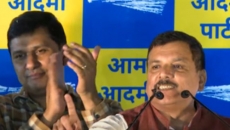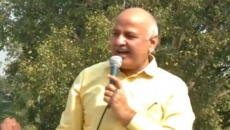Mumbai, July 11 (IANS) On the rainy evening of July 11, 2006, as millions of commuters hurried to their homes by the Western Railway (WR) suburban trains, they were stopped dead in their tracks at the high-peak hour, at around 18:24 hours (6.24 pm).
For the next 11 minutes, seven of the chock-a-block local trains were surgically targeted with ‘pressure cooker bombs’ innocuously placed in the first class gents compartments, which the harried crowds ignored.
Snuffing out 209 innocents, the terror attack became the second worst extremist disaster in Mumbai, preceded by the March 12, 1993 serials bomb blasts (257 killed) and followed by the November 26-29, 2008 terror strikes (166+9 terrorists killed).
When the commuters had settled down for the long commute to their waiting families, the ‘train bombs’ suddenly exploded with devastating results on several stations between Matunga (south Mumbai) and Bhayander (Thane) stations.
This led to massive chaos among the terrified commuters, the lights went off in many coaches, and left the WR authorities rattled plus shook awake the central and state administrations.
The multiple blasts in the trains, either running or halted at stations on their journeys, brought the usually efficient WR system to a grinding halt, but the pre-smartphone era mobiles and the still-reliable landlines were jammed, confusion reigned among the people and the officialdom.
As the suburban trains had stopped running and hordes of security personnel launched their primary investigations, lakhs of commuters trooped onto the road, grabbing any available mode of transport, but the main thoroughfares, highways, arterial roads and even local streets witnessed unprecedented traffic snarls.
Eyewitnesses remember that horrifying evening when the much-cursed and congested suburban trains earned silent prayers and blessings for reaching the commuters home quickly, safely and efficiently, barring of course the odd aberration…like July 11, 2006.
Hungry, thirsty, confused and stranded for hours in the BEST buses, autorickshaws, taxis, cars, vans, and two-wheelers, the ordinary Mumbaikars opened their hearts and rushed to their aid -- akin to the great floods of July 26, 2005, which claimed 1,094 lives.
In a show of solidarity in the face of the tragedy, thousands of Mumbaikars, ranging from slums to skyscrapers, poured out to offer umbrellas, raincoats, plastic sheets, tea-coffee-biscuits-snacks-light meals, complimentary to the bewildered commuters trudging home.
Many big and small restaurants offered refreshments-meals ‘on the house’ for that night, and the supplies continued till the stocks lasted or the last wayward commuter had his fill, in some cases till dawn the next morning.
Though the WR services had limped back shortly before midnight (July 11), the next morning many services had poor occupancy as people had barely reached home after last night’s ordeal.
Nevertheless, those who ventured out gawked with disbelief at the targeted coaches ripped apart in the bomb blast the previous evening, presenting an eerie picture of devastation at the stations where they were parked for the investigation teams.
The then Union Home Minister Shivraj Patil said that they had intel on the attack which did not specify the time or location, while the Mumbai Police rounded up more than 350 suspects.
The initial probe confirmed that the ‘pressure cooker bombs’ had a deadly brew of RDX+Ammonium Nitrate -- and the RDX, which first became a household name after the March 1993 serial bomb blasts, was apparently used for the second time in a big way for the July 11, 2006, strikes.
The multi-pronged investigations, the claims, denials by several of the usual offshore terror outfits, or the unfriendly neighbourhood off the borders, the investigators managed to zero in on the culprits who underwent a keenly-watched trial.
Finally, in September 2015, the Special Court of Maharashtra Control of Organised Crime Act (MCOCA) pronounced as guilty and convicted 12 persons, for the unnerving deadly strikes on Mumbai’s lifeline.
Four men who got the hangman’s noose are Faisal Shaikh, Kamal Ansari, Ehtesham Siddiqui and Asif Khan, convicted for planting the 7 ‘pressure cookers’ in the suburban trains.
The rest were awarded life in jail and they are -- Dr Tanvir Ansari, M. Sajid Ansari, Mohammed Ali, Muzammil Shaikh, Majid Shafi, Sohail Shaikh, Zamir Shaikh, for providing various kinds of support to execute the heinous crime.
Exactly 18 years on, only faint memories remain of that mayhem on the railway tracks, the families of the victims and the survivors remembered those 11 minutes but the vast commuters continued their daily grind in local trains as usual.





